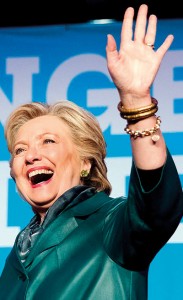Sunday Times 2
US presidential election
View(s):Trump’s ‘Snapchat’ foreign policy sucker punches US interests
By Mark P. Lagon

Donald Trump: If elected, he will be a 'transactional president'
This season of presidential debates is as dramatic as the boxing match the late Muhammed Ali dubbed the “Thrilla in Manila” against Joe Frazier. But one thing is not debatable — who would be the better foreign policy president.
It is tempting to make this assessment based on particular issues, like Russia or refugees, or statements deemed disqualifying for their bigotry, or lack of truth and transparency. It sure is for an academic and nonprofit foreign policy hand like me, who worked in the House, Senate, and State Department for Republicans.
But stepping back, there are larger grounds to assess the boxers, grounds on which Democratic presidential nominee Hillary Clinton is strong and Republican nominee Donald Trump is not.
There are three kinds of foreign policy presidents. The best understands that U.S. interests and values go hand in hand. Doing something morally right — like humanitarian relief, helping dissidents, or spending to fight global AIDS — isn’t pure altruism. He or she understands a freer and more prosperous world make for a strong America, and vice versa.
Harry Truman and Ronald Reagan are prototypes. They crafted strong strategies to take on the Soviet Bloc, combining military and robust assistance policies, tied to a broad moral vision of why democracy was a better model.
A second, lesser kind of president embraces a more one-dimensional realpolitik or pragmatism, setting aside broader ideals when faced with the world and regimes as they are.
Presidents George H.W. Bush and Barack Obama are examples. Despite the “good” Iraq war in 1991, the older Bush dispatched lieutenants to toast the butchers of Beijing after the 1989 Tiananmen Massacre, and lecture the Ukrainians not to engage in “suicidal nationalism” just when the Soviet regime was on the ropes.
Despite winning a Nobel Prize and shaping the Iran nuclear deal and international climate change agreement, Obama is similarly middling. Take his refusal to endorse the Green Movement in Iran when the 2009 election was stolen, or to take greater action against Assad’s atrocities before ISIS grew to commit added atrocities.
This second variety of president focused on the short- or medium- term, tolerating unsavory autocrats to maintain stability and U.S. interests — rather than prioritizing democracy and shared prosperity globally to serve long-term stability and interests like the best kind do.
The third kind of president lacks even this depth. Purely transactional, this administration has a time horizon of a snapshot — or rather Snapchat, with rationales disappearing — poof! — after the moment of a decision. This kind of president might assess an ally or opponent on their personality or a deal on the bargaining of the moment.
So what examples are there in this third group? None. And there’s a reason. Because it is it inimical to both U.S. interests and values.

Clinton clearly has the potential to be to be in the stronger class of foreign policy presidents
Yet this is precisely what Donald Trump represents. He exhibits unbridled confidence in being able to cut a deal. He admires strongmen, like Vladimir Putin, despite their brutality and mendacity. He invokes “making America great again” and “winning” while not recognizing interests even in a short-term sense. Scuttling NATO or profiling all Muslims and refugees as threats violate both our values and even a narrow view of our interests.
So what type of president would Clinton be? As Secretary of State, she championed how defense, diplomacy, and development needed to go hand in hand. She is a hawk willing to use military force when necessary but an advocate of soft power. She sees how a world economy that is inclusive – for instance, mobilizing women and girls as engines of growth – is not only just, but prudent. Her inclination and experience make her think like the first — best — type of president.
The worst case scenario is that she proves to be the second type, but even then she still isn’t the transactional Trump. This risky rascal is incapable of delivering steady, sturdy, stable statesmanship affording Americans room to forge better lives for themselves and their families.
But Clinton clearly has the potential to be to be in the stronger class of foreign policy presidents — because true leadership combines our interests and values. Truman and Reagan were hardly perfect either, but she shares their capacity to navigate the most turbulent of domestic and international politics. Americans will sleep better at night and thrive more during the day as a result
(Lagon is Centennial Fellow in the Walsh School of Foreign Service at Georgetown University, and was U.S. Ambassador-At-Large to Combat Trafficking in Persons from 2001 to 2009. He is an advisor to Republicans for Clinton in 2016)
-Courtesy The Hill
US Election 2016: Hillary’s campaign and Bill’s women
By Katty Kay

All the President’s women: Paula Jones, Monica Lewinsky, Gennifer Flowers
Early this year, Donald Trump made the seemingly audacious suggestion that Hillary Clinton was somehow responsible for Bill Clinton’s infidelities. Trump called her an “enabler” and said she “attacked the women who Bill Clinton mistreated afterward.”
In typical Trump fashion, the comment was designed to get attention. Mrs Clinton has been a champion of family issues and women’s rights throughout her career, so the idea that she was the enabler of someone Mr Trump has called “the greatest abuser of women in the history of politics,” appeared outrageous.
And yet, something resonated in Mr Trump’s description of Hillary. There was a kernel of truth to his claim and now it is hurting Mrs Clinton with young female voters.
The New York Times today has a long article outlining Mrs Clinton’s role in the political handling of her husband’s sexual affairs. It’s pretty damning, and for Clinton’s supporters it must make unpleasant reading.
Anyone with an iota of empathy, of course, sympathises with what Hillary Clinton went through during the Lewinsky scandal. I was here and covered the story. It was grim, and the image of Chelsea steadfastly holding both parents hands as they walked, heads slightly bowed, to the helicopter on their way to that summer holiday in Martha’s Vineyard will stick with me as one of the more poignant family portraits ever taken.
Dealing with a spouse’s unfaithfulness is traumatic in private. It must be an even deeper circle of Hell when splashed on the front of every newspaper.
What is disconcerting now, however, is Hillary’s role in pursuing the women themselves – Gennifer, Paula, Monica, they all, according to both the New York Times and previously published accounts, became the subject of brutal, organised discreditation campaigns.
In 1992, Hillary told Esquire magazine that if she had the chance to cross examine Flowers, she would “crucify her.” Taking such determined steps to destroy a woman’s reputation in order to protect her husband’s political career smacks of depressingly cynical calculation.
The Clintons hired a famous private investigator to dig up the women’s pasts with the aim of destroying their reputations. It is not clear from the Times’ reporting to what degree Mrs Clinton favoured this tough approach.
Did she drive it or just give it an accepting nod? Maybe the more relevant point is that she condoned it. Hillary also famously called Ms Lewinsky a “narcissistic loony toon,” according to a friend’s testimony. A staff member who was close to Hillary said she referred to Mr Clinton’s affairs as “bimbo eruptions”.
And there’s the problem for young women voters.
Why should the character or the sexual past of these women be relevant to the truthfulness of their claims? Indeed, Mr Clinton went on to confess to affairs with both Ms Flowers and Ms Lewinsky, after initially denying them.
By discrediting the women, the Clintons were spreading the subliminal message that it was somehow their fault more than Bill’s.
What were they trying to prove – that he was led astray by sexual predators? In 2016 that sounds grotesque.
Today’s sexual mores are very different from the 1980s and 1990s. Young women today expect women to stand up for other women, particularly in the area of sexual relations and particularly when those sexual relations involve a very powerful man and a younger woman.
Younger women who have been through bruising college sexual abuse scandals across America have little tolerance for women who in any way cast blame on the victim. That empathy extends to consensual affairs – they just don’t like women shaming other women. Which is exactly what Hillary Clinton was complicit in doing, according to the New York Times, and other previous accounts.
Mrs Clinton’s supporters say this is all old news, and is part of a right-wing attempt to slime her. Many millennial voters weren’t even born when Monica and Bill were cavorting in the Oval Office. This is their first introduction to this sordid story.
However the Clinton campaign tries to spin it, it just doesn’t look great for their candidate.
- Courtesy BBC
| Clinton leads Trump by 6 points By Freya Berry Hillary Clinton is leading Donald Trump by six points, a Reuters/Ipsos poll showed, as the candidates prepare to do battle at the second presidential debate. Clinton sits comfortably ahead at 42 points, against Trump at 36. Libertarian Gary Johnson gets 8 per cent while the Green Party’s Jill Stein gets a 2 per cent share. The poll was conducted online before the vice presidential debate on Tuesday night, which a snap CNN survey indicated that Trump’s running mate Mike Pence had won. Another poll, conducted Monday-Wednesday by Rasmussen and published Thursday, had Trump ahead of Clinton at 43 points to 41. The phone and online survey has a margin of error of 2.5 points and was partially done after the VP showdown. Gravis research published Wednesday had them both level-pegging at 44 points each. © Daily Mail, London
|

